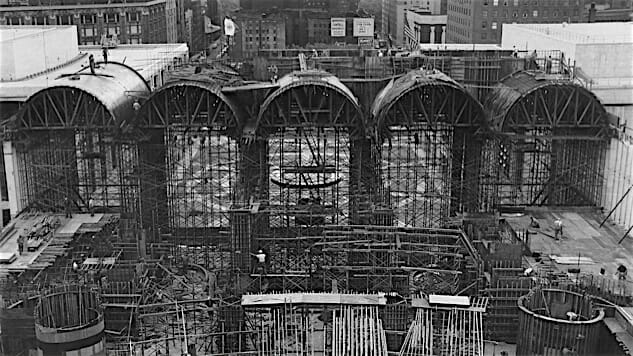
There is a sort of life force that performance spaces often possess, as if they retain some of the energy of every great performer who has stepped onto their stages. You can feel it if you stand there quietly, a kind of hum. Great theaters, opera houses, concert and symphony halls are electrifying spaces designed to elevate and focus the performance and the experience of receiving the performance. Even when they’re empty and silent, you can feel it.
Designing one and getting it built is a big deal.
The Opera House is a lovingly detailed history of New York’s Metropolitan Opera and specifically its journey from its original space to its current one at Lincoln Center. It’s collaged from a vast archive of still photos, film and video clips, and live interviews with some of the Met’s stars and some of its unsung (if you will) heroes, including ushers and managers and archivists. Of many wonderful interviews, the standout is the amazing soprano Leontyne Price, whose recounting of memories of the Met are mesmerizing. There are reminiscences and footage of interviews from the past, and almost all are intriguing.
If you’re an urban planning geek or a Met superfan, or if you just can’t get enough New York history, this documentary is probably going to be a lot of fun. If you’re not, it’s admirably detailed but might come across as a bit dry and self-satisfied. (I got restless a few times.) The midsection, concerned with the demolition of “slums” and the construction of what is now Lincoln Center, feels a bit padded and meandering—the interviews with people displaced by that redevelopment are not uninteresting but they take you out of the story of the Met for quite a long time. Equally frustrating: It then takes on the incredibly fascinating facet of what building Lincoln Center meant as a political act at the height of the Cold War but doesn’t quite go deep enough. (Was the project in part bankrolled by the Congress for Cultural Freedom? There’s a speech by President Eisenhower that seems to be implying it, and a strikingly defensive public service announcement that emphasized the “free will” and individually financed nature of the project.) By the midpoint of the film you might develop the sense that perhaps too much time was spent on the “Old Met” and that it’s taken too long to get into the meat of the narrative, which is really the building of Lincoln Center, but there’s a lot of wonderful material in the first hour that I’m sure I would have been loathe to lose, too. And ultimately it does tie itself to negative public sentiment over the closing of the old house. It just feels a little overstuffed.
Overall, this is an easy film to admire—it’s exhaustively detailed and an intriguing collage of an important American institution. It could be argued that it tries to do too much. As a repository of facts and opinions, experiences and memories around the Met, it’s pretty amazing. But it could probably have been edited more tightly. Ultimately, The Opera House is really the story of “The Opera Houses,” as the old and new structures get almost equal screen time, and while I understand the appeal of that decision, there are places where it becomes distracting or a little overweight. That said, this is something to watch if you love opera, or architecture, or history, or New York.
Director: Susan Froemke
Release Date: Jan 13, 2018
Amy Glynn writes for Paste.